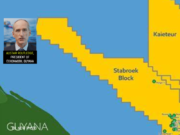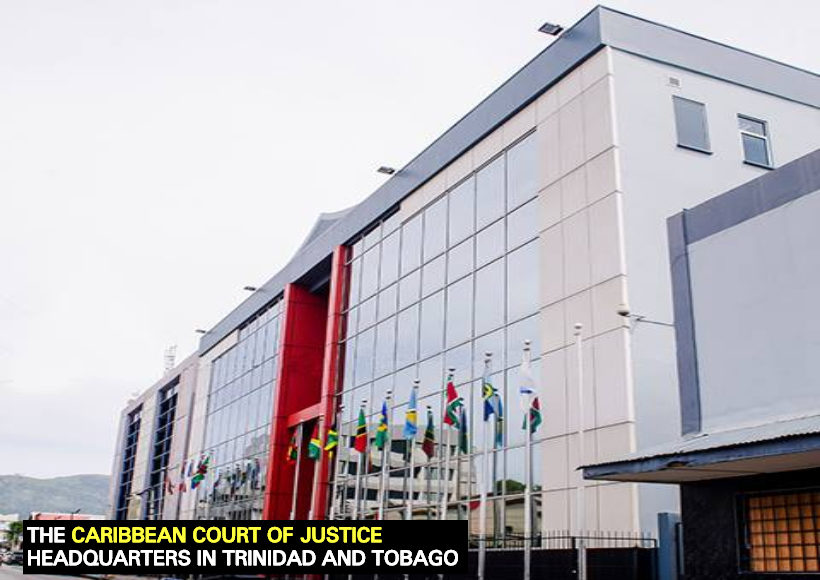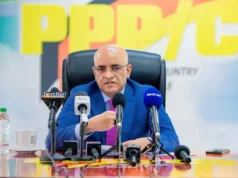President of the Caribbean Court of Justice (CCJ) Justice Adrian Saunders held firm that it is not the role of the regional court to issue a date for or by which general and regional elections in Guyana must be held. In fact, Justice Saunders emphasised that the Coalition Government is in caretaker mode.
The CCJ’s judgment comes at a time when the Parliamentary Opposition had asked the court to make coercive orders against the government that President David Granger is to dissolve Parliament and for elections to be held by September 18, 2019.
In the court’s ruling on consequential orders in relation to the no-confidence Motion case, Justice Saunders said, “It is not, for example, the role of the court to establish a date on, or by which the election must be held or to lay down timelines or deadlines that in principle are the preserve of political actors guided by constitutional imperatives. The court must assume that these bodies and personages will exercise their responsibilities with integrity and in keeping with the unambiguous provisions of the Constitution bearing in mind that the no-confidence motion was validly passed as long ago as December 21, 2018.”
Justice Saunders reiterated that the government, as it stands, is expected to behave during this interim period as a caretaker and so refrain from the exercise of its legal authority. According to him, this “caretaker or interim role” is spelt out in Article 106 (7) of the Constitution of Guyana for the holding of fresh election.
He said that while the article calls for the resignation of the president, including the Cabinet, it was important for the court to note that government shall remain in office notwithstanding its defeat for the purpose of holding general elections. Justice Saunders reasoned that given that the no-confidence motion was passed on December 21, 2018, elections were due by March 21, 2019.
“The filing of the court proceeding in January challenging the no-confidence vote effectively placed matters on pause. But this court rendered its decision on June 18, 2019; there is no appeal from that judgment. Article 106 of the Constitution invests in the President and the National Assembly and implicitly in GECOM responsibilities that impact on the precise timing of the election which must be held. It would, therefore, not be right for the court by the issuance of coercive orders or detailed directives to presume to instruct these bodies on how they must act and thereby pre-empt the performance by them of their constitutional duties.”
The CCJ maintained that due observance of constitutional democracy and the rule of law in Guyana rests in large measure with the conduct of the various branches of government, that is, the President and the Cabinet, the Parliament and the Judiciary. Further, the court added that all must be faithful to the spirit and letter of the constitution and operate within the parameters given to each by the constitution.
“The judiciary interprets the Constitution but, as we [indicated] in our earlier judgment, these particular provisions requires no gloss on the path of the court in order to render them intelligible and workable. Their meaning is clear and it is the responsibility of constitution actors in Guyana to honour them upon the passage of a vote of no confidence the Article requires the resignation of the president and the Cabinet.”
Meanwhile, the CCJ made a number of declarations and order. These declarations and orders are: the provisions of Articles 106 (6) and (7) of the Constitution apply to a no-confidence motion; 33 votes constitute a majority of the 65-member national assembly; Charrandass Persaud was ineligible to be elected to the National Assembly by virtue of his citizenship to Canada, but his vote in the motion of no confidence was valid; nothing in anti-defection regime established at Article 156 (3) rendered Persaud incapable of casting his vote on that motion in the manner in which he did; the National Assembly properly passed a motion of no-confidence on December 21, 2018, and, upon the passage of such a motion, the clear provisions of Article 106 immediately became engaged. Furthermore, costs were awarded to Opposition Leader Bharrat Jagdeo and Persaud, respectively, to be taxed, if not agreed, and in each case, those costs are to be paid by the AG.











